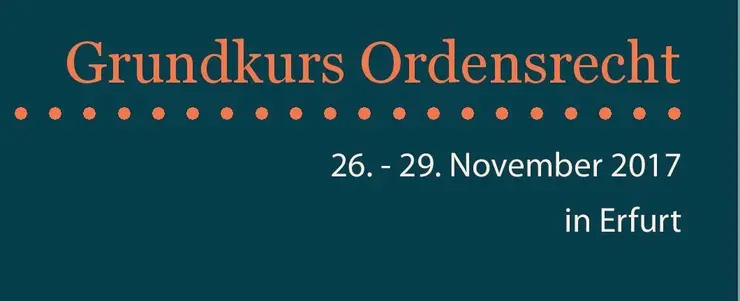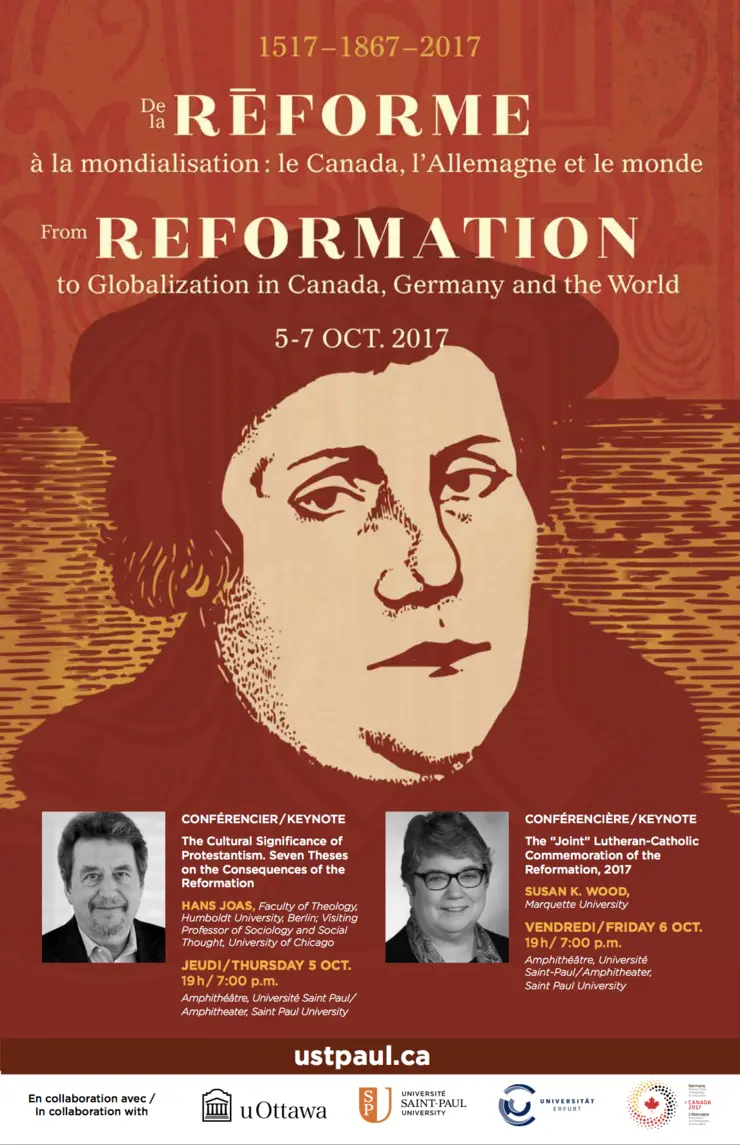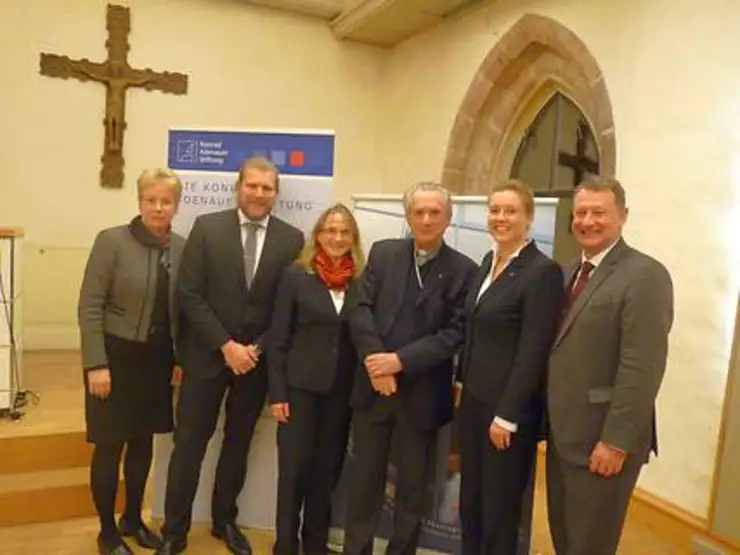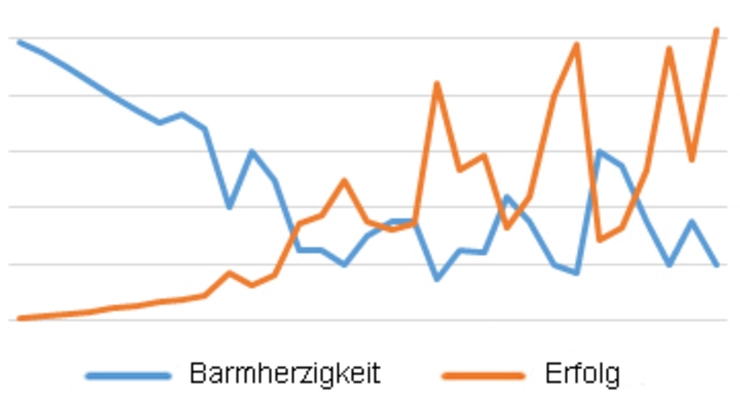
Does the current financial system meet the requirements of ethics and law? The demands of ethics and law on the economy are the focus of current social discourse. Meeting such requirements is a challenge for the financial system of our time. The question of what a system that meets these requirements can look like and what it will look like in the future is one that is constantly being asked.
Prof. Dr. Ulrich Hemel will take up this topic and link it to the document of the Congregation for the Doctrine of the Faith on "Consideration on an ethical distinction with regard to some aspects of the current financial economic system".
Subsequently, we will discuss with Prof. Dr. Ulrich Hemel, Antje Tillmann, Member of the German Bundestag, and Matthias Wierlacher, Chairman of the Board of Directors, the following questions: "What are the consequences of the growing influence of the markets on social prosperity? What dynamics can be identified in the regulation of these markets?
Prof. Dr. Myriam Wijlens has been advising religious institutes worldwide for more than 25 years, especially with regard to aging communities and the necessary structural changes in leadership that accompany them. She noted that from about 2025 onwards many religious institutes, especially institutes of religious women, but also the provinces of religious men will no longer be able to provide their own members for leadership in Europe. The question arises as to the implications of this development for the financial responsibility which the European parts of the institutes will have for those outside Europe.
Together with Andreas Machnik, Director of the Foreign Customers Branch of Pax Bank eG, she offers the following workshop at the Bildungshaus St. Ursula in Erfurt on 5-6 November 2018:
Missionary work in structural change. Problems and options for action in the continuation/replacement process of young mission areas from ageing mother communities.

Pope Francis emphasizes the need for decentralization of the Church, because the communication of God with people (revelation) cannot be understood without respect for the context, and because effective evangelization cannot take place without respect for society and the condition of people. The Bishops' Conferences have a key role to play in this, since they connect the local and universal Church(es). Consideration of context and decentralization require reflection on diversity and unity. This is a challenge especially in view of the teaching activities of the Bishops' Conferences.
The international research group "Peter and Paul Seminary", which has been moderated by Prof. Dr. Myriam Wijlens since 2004 and which is primarily concerned with necessary reforms of the Church in the ecclesiological field, will address this question at a conference in Erfurt from 11-13 November 2018. At the conference in Erfurt, 16 experts from 11 nations and four continents will exchange views on this topic. Working languages are English and French. The research group has already visited Georgetown University in Washington DC, Saint Paul University in Ottawa, the Catholic Universities of Louvain and Louvain de neuve (Belgium) and the Institut Catholique in Paris.

Due to the great success of recent years, the Bildungshaus St. Ursula Erfurt in cooperation with Prof. Dr. Myriam Wijlens organized for the third time a "Basic Course on Religious Law" from November 26-29, 2017, in which basic knowledge of ecclesiastical religious law was taught (Flyer). It was also offered in English from 30 April - 3 May 2017 in the Cardinal-König-Haus in Vienna. As advisor to the Conference of Religious Orders in the Netherlands and to several religious communities throughout Europe, Prof. Dr. Myriam Wijlens can draw on a specialist knowledge of ecclesiastical religious law that is both theoretically well-founded and applied in practice. As a sought-after speaker on this topic, she has not only given several lectures, among others at the invitation of Solidaris GmbH and Pax Bank e.G. in Rome, but has already offered the "Basic Course in Religious Law" in 2014 and 2016 in the Cardinal-König-Haus in Vienna with lively participation.
Invited were members of religious orders, but also people who work in the administration of the orders or are active in an advisory capacity.

The year 2017 includes the 500th anniversary of Martin Luther's supposed sending of his 95 theses as a signal event of the Protestant Reformation, as well as the celebration of the 150th anniversary of the founding of the Dominion of Canada. This dual anniversary will be celebrated with an exhibition of Reformation libraries and an academic conference at Saint Paul University and the University of Ottawa together with the University of Erfurt and with the support of the Library and Archives Canada, the Research Library Gotha and the Embassy of Germany in Canada.
The exhibition "The Reformation - Translation and Transmission: Library Treasures from Germany and Canada" will provide a unique presentation of the global impact of the Reformation by bringing together original editions and translations of Martin Luther's works and other important Reformation texts from the Gotha Research Library, Saint Paul University and the Library and Archives Canada.
In conjunction with the exhibition, the academic symposium "From the Reformation to Globalization in Canada, Germany and the World" will explore the myriad and fruitful forms of the Reformation's impact on many areas of religion, politics, society and culture, both in Canada and Germany, and in the rest of the world. Academic experts from many different disciplines will present their research on these linkages. The main presentations will be given by the renowned scholars Hans Joas (Humboldt University Berlin) and Susan K. Wood (Marquette University, USA).

Values, attitude, basic orientation - entrepreneurs and their social responsibility
Entrepreneurial activity is designed to generate profit, but is at the same time always responsible for people and the environment. How entrepreneurs acknowledge and fulfil their responsibility depends entirely on their individual values, whether they are in large corporations or small and medium-sized enterprises.
Profit and turnover are classic goals of successful business management, but can making a profit be an end in itself? Doesn't a company also distinguish itself through intangible assets and responsible action in its management? Which values play a role for entrepreneurs? What strategies do they pursue to meet their individual social responsibility? So what distinguishes a "good" company? What is its "value" measured by?
Pope Francis addresses these economic questions openly. What challenges does he see? What theses does he put forward?
The Chair of Canon Law in cooperation with the Konrad Adenauer Foundation and the Federation of Catholic Entrepreneurs explored these questions in a joint event on 12 January 2017 in the rooms of the Catholic Theological Faculty. After a fruitful discussion with the Bishop em. Adrianus van Luyn SDB and the entrepreneurs Dr. Ulrike Jaeger and Hans-Christian Fritsch, the organizers invited to a small reception for meeting and personal talks.

Are "success" and "mercy" opposites for a company management? What does success mean in the face of mercy? Why should it be thought about at all and by whom? How must and can one think about the relationship? How does it look like in practice?
The social and business ethicist and religious Prof. Dr. Clemens Dölken OPraem and the entrepreneur Dr. Dr. Thomas Rusche (SØR Rusche GmbH, Oelde) gave lectures on this topic. In the subsequent panel discussion, the entrepreneur Mrs. Colette Boos (Bauer Bauunternehmen GmbH, Walschleben) joined the speakers and the audience.
The Chair for Canon Law of the Catholic Theological Faculty of the University of Erfurt invited in cooperation with the Political Education Forum Thuringia of the Konrad Adenauer Foundation and the Association of Catholic Companies.
After Pope Francis had enacted the Motu proprio Mitis Iudex Dominus Iesus, a number of questions arose for diocesan bishops, officials, judges, marriage lawyers and attorneys, concerning both the content of the law of marriage and the law of procedure. For this reason, Prof. Dr. Myriam Wijlens organized a symposium on the changes in the marriage proceedings on Thursday, 17 December 2015 in the rooms of the Catholic Theological Faculty of the University of Erfurt from 1:00 - 4:45 pm. Prelate Prof. Dr. Markus Graulich SDB, the Under-Secretary of the Pontifical Council for Legal Texts, could be won for a lecture with subsequent discussion.
The Chair of Canon Law of the Catholic Theological Faculty of the University of Erfurt, in cooperation with the Political Education Forum Thuringia of the Konrad Adenauer Foundation and the Association of Catholic Enterprises, invited to a public lecture and subsequent panel discussion on the topic "The Church and its Finances: State Services - Supervision - Transparency" on Wednesday, January 21, 2015 from 6:00-20:00 p.m. About 200 guests attended the event.
The lecture was given by the current Provost of the Cathedral and former Vicar General and Economist of the Archdiocese of Cologne Dr. Norbert Feldhoff. Feldhoff dealt with church finances against the background of the topic of "state benefits" as well as other state financial contributions which the churches receive for tasks they have taken on, especially in the school and charitable sector. The affair in the diocese Limburg had shown how important transparency and independent supervision are if the church wants to be regarded as credible in society.
During the subsequent panel discussion with the invited guests Antje Tillmann, member of the Bundestag and financial policy spokesperson of the CDU/CSU parliamentary group, Stefan Große, head of the financial department of the Central German Protestant Church, and Thomas Höche, auditor and tax consultant of Solidaris Revisions-GmbH, Feldhoff's proposal for the Archdiocese of Cologne and the state of North Rhine-Westphalia to initiate a first step towards replacing state benefits by redirecting annual payments to promote socially relevant purposes was discussed. At the same time, Feldhoff pointed out that the state benefits in the new federal states would make a considerable contribution to the financing of church budgets. Therefore, he said, the East German dioceses and regional churches would face the challenge of proposing other, i.e. their own, approaches to solving the problem.
The evening was rounded off with a reception, which offered space for personal encounters and questions.
"Euthanasia - yes or no?", is a question that repeatedly makes its way into public discourse: Günther Jauch asked his guests the question "My death belongs to me! Is there a right to die in a self-determined way"; the Spiegel bestseller list ranked Jojo Moyes' "Ein ganzes halbesammeljahr" (A whole six months) in first place; in Belgium the parliament voted on active euthanasia for minors.
Within this discourse the Catholic Church positions itself as an advocate for the absolute inviolability of human life. Irrespective of and without prejudice to the moral condemnation of the conscious termination of life, the Church, against the background of Jesus' missionary mandate, is at the same time called upon to provide pastoral care also to those people who ask for euthanasia. The question arises how this pastoral care is to be organized without disregarding the Church's own teaching on the inviolability of human life. What factors must be taken into account when deciding on the administration of the Sacraments of the Sick (Anointing of the Sick, Viaticum) and the celebration of the Church's exequia (Requiem, Church burial)? In order to be able to answer these questions fairly, the Catholic Church is dependent on contributions from various disciplines. For example, Prof. Dr. Myriam Wijlens, Professor of Canon Law at the University of Erfurt, invited to an interdisciplinary colloquium on 7 February 2014. Experts from the fields of medicine, ethics, moral theology and canon law provided the numerous students and interested parties from the greater Erfurt area with important impulses for the decision-making process.
The conference "In quibus et ex quibus: The Interaction between Local and Universal Church 50 Years after Vaticanum II in Eastern Germany", organized by the Chairs of Church History of the Middle Ages and the Modern Era, of Canon Law and of Liturgical Science, took place in the rooms of the Faculty of Catholic Theology of the University of Erfurt from 7 to 8 December 2012.
In addition to the invitees - Prof. Dr. Josef Pilvousek, Prof. Dr. Myriam Wijlens, Prof. Dr. Benedikt Kranemann - Prof. Dr. Gilles Routhier (Systematic Theology, Council Research, Quebec), Prof. Dr. Rüdiger Althaus (Canon Law, Paderborn), Prof. em. Dr. Dr. hc. Hermann J. Pottmeyer (Fundamental Theology, Bochum), Dr. Michael Quisinsky (Systematic Theology, Lausanne), Prof. Dr. Ormond Rush (Fundamental Theology, Brisbane), Sebastian Holzbrecher (Church History of the Middle Ages and the Modern Era, Erfurt) and Dr. Joachim Wanke (em. Bishop of Erfurt) were invited as speakers.
"From Darkness to Light - Consequences of the Cases of Sexual Abuse for the Church Leadership" was the title of a conference to which the holder of the Chair of Canon Law at the University of Erfurt and Dr. Wunibald Müller, Director of the Recollectio Haus of the Benedictine Abbey of Münsterschwarzach had invited. The background is that now that the first cases of sexual abuse within the Catholic Church have been cleared up to some extent, the focus must now be on prevention. Socially and ecclesiastically the question arises, where to put the perpetrators? How can a renewed abuse be prevented? In order to be able to take appropriate measures, it is necessary to know, for example, how the judicial decisions come about and what they contain. Against the background of this knowledge, the question arises as to what possibilities the church leaders have to react adequately. These topics were the subject of the conference in which experts from all over Germany participated. Speakers were, in addition to the inviting Dr. Wunibald Müller and Prof. Dr. Myriam Wijlens, Holger Pröbstel (presiding judge at the Erfurt Regional Court), Father Michael Baumbach MSF (member of the Provincial Council), Dr. Karl Hillenbrand (Vicar General of the Diocese of Würzburg). To the press release of the University of Erfurt.
The working group of the Faith and Order Commission of the World Council of Churches met from 25 February - 1 March 2011 in the Augustinian Monastery in Erfurt. The topic was "Moral judgement in the churches". A study text was written which deals with the different interpretations of moral questions within the churches.
On 10 February 2011, the Chair of Canon Law of the Catholic Theological Faculty of the University of Erfurt and the Institute for Ecumenical Research Strasbourg invited to a conference on the published ecumenical document "Communion of Churches and Petrine Ministry: Lutheran-Catholic Approaches" (ed. group by Farfa Sabina. Lembeck 2011).
The Farfa Sabina group is composed of seven Catholic and seven Lutheran theologians from Scandinavia, Germany, France and Italy - all of whom are proven ecumenists and all of whom have been involved in the dialogue between Catholicism and Lutheranism for many years. The project was placed under the aegis of the Order of Birgittine and was carried out within the framework of the International Birgittine Centre in Farfa Sabina northeast of Rome. It was stimulated not least by Pope John Paul II's invitation to the churches to enter into a dialogue with him on the unity ministry of the Bishop of Rome.
Farfa Sabina's group shares the conviction that the restoration of the "unity of the Church" consists in the restoration of the "communion of (independent) churches". On this ecclesiological basis, they explore the question of whether a common understanding of a future universal ecclesial office of unity can be achieved and whether and how such an office can serve this communion of churches.
At the conference the content of the document was presented by the members of the dialogue group Prof. Dr Hermann Josef Pottmeyer and Prof. Dr Theodor Dieter. On the church side, Bishops Dr Joachim Wanke (Erfurt) and Dr Friedrich Weber (Braunschweig) made a first statement.
The discussion was moderated by the member of the dialogue group Prof. Dr. Myriam Wijlens.
In the context of increasing Europeanisation and against the background of the provisions of the Maastricht Treaty and the Amsterdam Declaration that religion and religious communities should remain within the sphere of competence of the individual Member States, the question arose as to how the relationship between religion and religious communities on the one hand and society on the other hand has developed in Germany's neighbouring countries.
After the Laicité in France was the subject of a conference at the Catholic Theological Faculty in Erfurt in 2006, the Netherlands, which is perceived as extremely secularized, was taken into closer consideration. The public conference, which was organized by the chairs of Canon Law (Prof. Dr. Myriam Wijlens) and Liturgical Science (Prof. Dr. Benedikt Kranemann), took place on February 5 and 6, 2010 in the Coelicum lecture hall, Domstraße 10.
With lectures on social development (E. Borgman), the determination of the state-church-relationship (S. van Bijsterveld), euthanasia (F. Vosman), religion in the media (J. Hemels) and rituals (T. Swinkels), the influence of religion and religious communities on Dutch society was to be examined.

"Berlin, Berlin, we are going to Berlin", some students of the Catholic Theological Faculty of the University of Erfurt were pleased to say on 31 October 2016, because while the lecture "Church Law for Leadership Personnel" usually deals purely theoretically with legal entities through which church organisations participate in civil and church legal relations, Prof. Dr. Myriam Wijlens from the Chair of Canon Law invited to a "practical test" on this day.
As already in 2013, the students could expect an extremely varied program under the motto "Catholic Church in Germany - Encounter with Persons and Institutions".
At the beginning our group was warmly welcomed in the Catholic office. Ms. Katharina Jaenstedt, Deputy Director of the Catholic Office Berlin (Commissariat of the German Bishops' Conference), gave a vivid and informative presentation about the multifaceted work of the Catholic Office, which interacts with German politics at the federal level on behalf of the German bishops, but also takes on coordinating tasks within the Church.
Afterwards Mr. Eisend, scientific adviser of the Catholic Military Bishops Office, gave information about the work and the structures of the military pastoral care, which as "Church among the soldiers and their families, partnerships and relatives" ensures their pastoral care on behalf of the Church and the state.
In the afternoon Ms. Katrin Gerdsmeier presented the associational structures of Caritas. Even though Caritas is perceived by the public as a large unified institution, it is composed of more than 6,000 autonomous, i.e. independent, regional associations and institutions. This poses the challenge of acting as a unified association, but also the opportunity to be able to respond quickly and easily to regional needs.
The excursion finally ended in the Apostolic Nunciature, the Vatican's embassy. There, Pastor Jürgen Doetsch, staff member of the Nuncio, patiently answered questions and drew a very detailed picture of the many-sided diplomatic tasks of the Apostolic Nuncio, who represents the Pope not only in relation to the Federal Republic of Germany but also to the respective local churches.